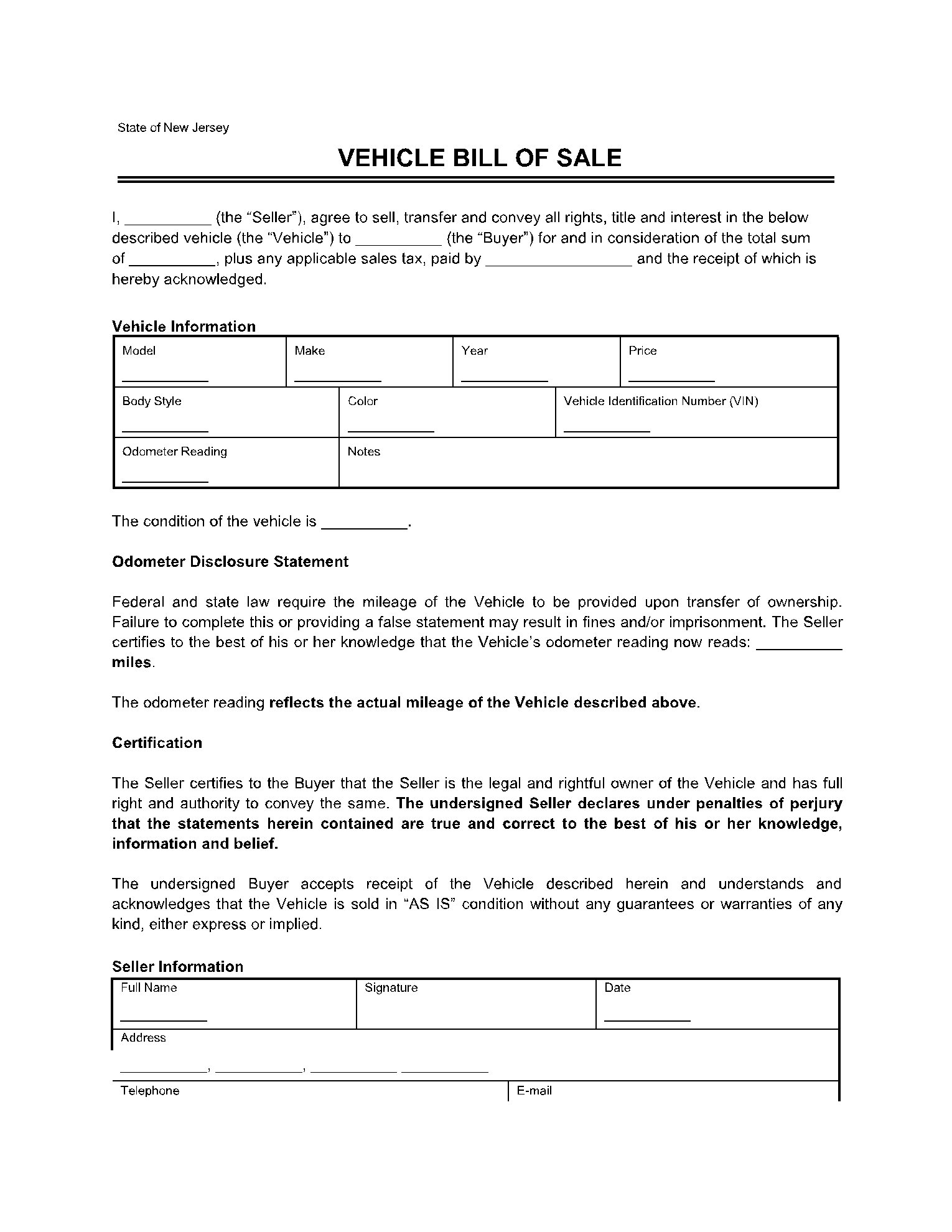What is a New Jersey Vehicle Bill of Sale Form?
When a vehicle is sold privately and registered to a new owner, an NJ DMV bill of sale is required in some situations. The buyer and seller's personal information and technical data about the car being transferred, such as the make, model, year of production, and VIN, should be included in the NJ bill of sale.
To verify the private deal information's authenticity, both the buyer and the seller should sign the bill of sale NJ. The car bill of sale in NJ must be notarized.
How to Sell or Buy a Car?
The steps you must take as a car seller to sell your vehicle are as follows:
- Remove the car's license plates and take them to any NJ Motor Vehicle Commission (MVC) office or regional service center.
- You do not have to surrender the plates if you are transferring them to another car.
- Make sure to sign the title on the back of the bill of sale NJ and include the following information:
- The buyer's name and address.
- The number of miles on the odometer.
- The date of the sale.
- The vehicle's sale price.
You have ten business days from the date of the sale to move the title. You would only need the original certificate of title, along with all details on the back, when selling a car in New Jersey. You may need to fill out paperwork if the vehicle has a lien or is excluded from sales tax.
Important Details of a Vehicle Bill of Sale Form:
The following is a list of the generally included information in a New Jersey bill of sale.
- The vehicle's year, make, and model.
- Vehicle description.
- Both the buyer’s and the seller's names and signatures are needed.
- The number allocated to a car (VIN).
- The vehicle's purchase price.
- The reading on the odometer
Why Do You Need a Vehicle Bill of Sale in New Jersey?
An NJ DMV bill of sale is a written contract in which the owner of a used car transfers his or her rights or interest in the vehicle to the buyer. This form would be highly beneficial in the sale of used automobiles. When attempting to obtain car insurance or prove ownership, a bill of sale form NJ can be one of the documents required to determine a buyer's proof of ownership.
If a dispute occurs later, the record may assist the seller or buyer in establishing their case. Furthermore, NJ’s vehicle bill of sale acts as evidence that the buyer purchased and owns the car. Last but not least, the document is what you'll use for tax and accounting purposes.
How to Write a Vehicle Bill of Sale?
The following guidelines are based on the custom car bill of sale NJ form.
- Step 1: Insert the date on which the document was produced.
- Step 2: Include the following information for each party (seller and buyer):
- Name, street address, city, state, and zip code
- Phone number
- Step 3: Fill in the following information about the car or truck:
- the manufacturer
- Model of the vehicle
- Style of body
- Year of manufacture (MY)
- Odometer Reading
- VIN
- Color
- Step 4: Choose a payment method and a price.
- Step 5: Review the miscellaneous provisions.
- Step 6: Now it's time to sign the contract.
- Step 7: Enlist the assistance of a notary public.
This section also allows you to include the purchase date and the total amount agreed by all parties. If that's done, you'll need to define the transaction method. You must enter the dates on which the purchaser must make the first and final payments, as well as their amounts, using this form.
The "as-is" clause specifies that the seller makes no warranty and is not responsible for any repairs after the sale.
In most cases, the buyer's signature is not needed. However, if both parties sign the form, you'll be better shielded from legal issues.
You'll be better protected legally as a result. This step, however, is typically optional.
The buyer must receive the original document copy because they need it to obtain a title for their newly purchased vehicle. As a seller, you have the option of getting a copy and keeping it or having two similar documents signed and filled out by both parties.
Conclusion
The bill of sale NJ allows you to keep track of the vehicle’s transfer of ownership and all transactions. It protects you from potentially dangerous circumstances in the future.
You must carefully fill out all of the credentials and send all of the necessary paperwork to the NJ Motor Vehicle Commission office to obtain a legal bill of sale. Signatures should be included as evidence that all parties have agreed to the agreement and payment terms.
